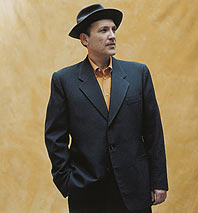
Everybody loves Osvaldo Golijov right now, especially Lincoln Center, which is in the midst of a monthlong celebration of the Argentine composer and his work. In the carefully curated world of classical music, this is a pretty extraordinary tribute, usually extended only to such high-profile names as Philip Glass, Steve Reich, or John Adams, prolific senior composers with a proven track record. At 45, Golijov has just one smash hit to his credit: the genre-busting oratorio La Pasión Según San Marcos, an updated, streetwise Crucifixion drama drenched in the heady sounds and rhythms of Latin America and the Caribbean. The work, first heard six years ago, closes Lincoln Center’s festival with performances on February 20 and 21, and will surely intoxicate many more listeners with its sheer theatrical extravagance.
After the St. Mark Passion, Golijov composed nothing of comparable size and ambition until his first opera, Ainadamar, which opened Lincoln Center’s salute at the Rose Theater in the production staged last summer in Santa Fe. This is a revised version of the score premiered at the 2003 Tanglewood Festival, where it received a rather muted reception. Perhaps, after the extroverted drama of the Passion, audiences were not expecting this subdued, brooding meditation on the Spanish poet-playwright Federico García Lorca, executed in 1936 by Fascist soldiers at Ainadamar, the “fountain of tears,” in Granada. Whatever problems the opera might have had, they now appear to be solved. This 80-minute piece of music theater is a quiet spellbinder, an astonishing demonstration of how an opera can sound completely contemporary yet still convey its message in very potent lyrical song.
The text, by David Henry Hwang, puts its main focus on the great Catalan tragedian Margarita Xirgu, who collaborated with Lorca on his plays. As an old woman near death in 1969, she recalls in a dreamy series of flashbacks the hopes and passions that Lorca inspired through the principles of freedom he espoused so eloquently. Their friendship was intense but not romantic, since both Xirgu and Lorca were gay. Perhaps that explains Golijov’s decision to write the poet-playwright’s role for a mezzo-soprano, an inspired stroke that results in a deliriously visionary finale for the dying Lorca, Margarita, and her student Nuria that rivals the trio of Strauss’s Der Rosenkavalierin its sensuous beauty and luscious intertwining of female voices. But there’s scarcely a measure that doesn’t grab the ear, as Golijov turns the sounds of galloping horses, rifle shots, and Granada’s gurgling waterways into powerful musical images that sum up the dramatic moment with original twists of compositional ingenuity.
Peter Sellars’s understated, fluidly choreographed stage direction caught the opera’s quiet tone with a lyrical grace that everywhere mirrored the poignancy and easy flow of the action. Earthy passion may not come naturally to Dawn Upshaw, but difficult vocal challenges do, and she boldly stretched her cultured soprano to fit Margarita’s deep-seated emotions. Even better, Kelley O’Connor sang straight into the heart of Lorca’s music with her hauntingly husky mezzo-soprano. Jessica Rivera as Nuria, a vibrant ensemble of eight women’s voices, and the Orchestra of St. Luke’s under the direction of Miguel Harth-Bedoya were all clearly gripped by the piece. A full-length opera from Golijov is now an absolute must. Peter Gelb, the Metropolitan Opera’s general-manager-elect, was in attendance and, I can only hope, backstage after the performance getting the composer’s signature on a contract.
The Passion of Osvaldo Golijov. Lincoln Center. Through February 22.